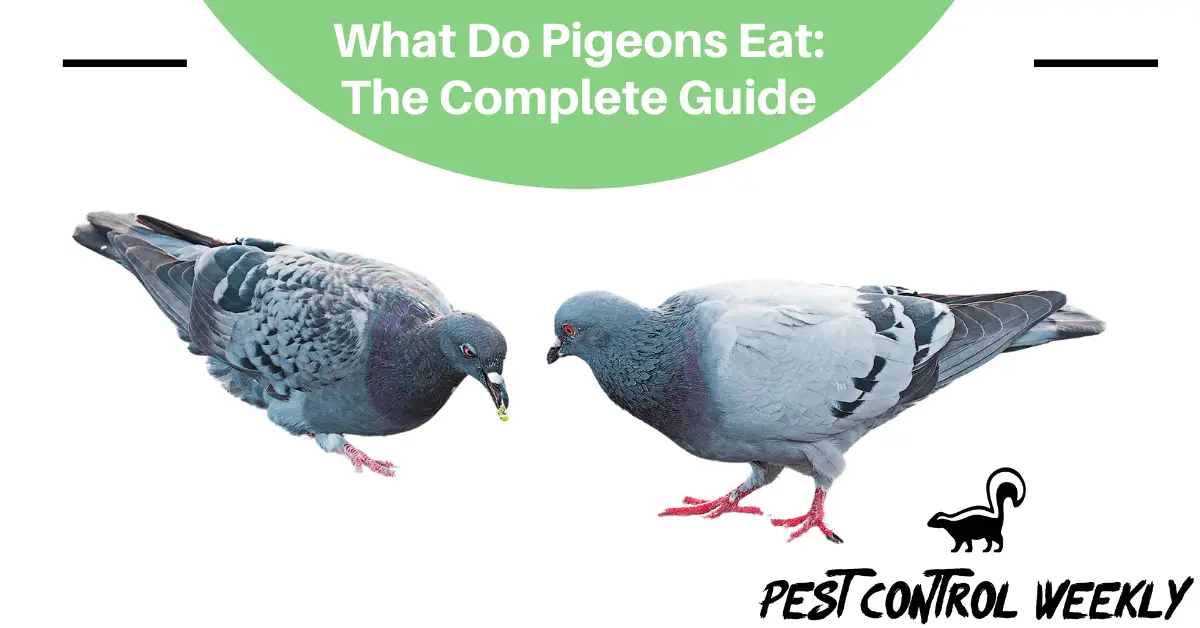I’ve always wondered what do pigeons eat since they flock in my garden a lot. Many people consider pigeons as vermin and associate them with a lot of noise and poop. However, they are becoming common guests in many gardens.
You might have noticed pigeons setting up camp on your well-manicured lawn or your building.
Pigeons are generally always on the lookout for food, shelter, or a mate. It is also possible for pigeons to be attracted to people, especially those who feed them. If you see pigeons on your property, it is likely there are some seeds or grains and water.
The reasons pigeons are attracted to your lawn, or your building might be because food in your yard or roof keeps them coming for more.
Pigeons are pretty resourceful birds that are good at surviving. This is why you will find them eating pretty much anything. They do have favorite foods such as grains, shoots, seeds, grubs, and insects which might be why they are attracted to your garden.
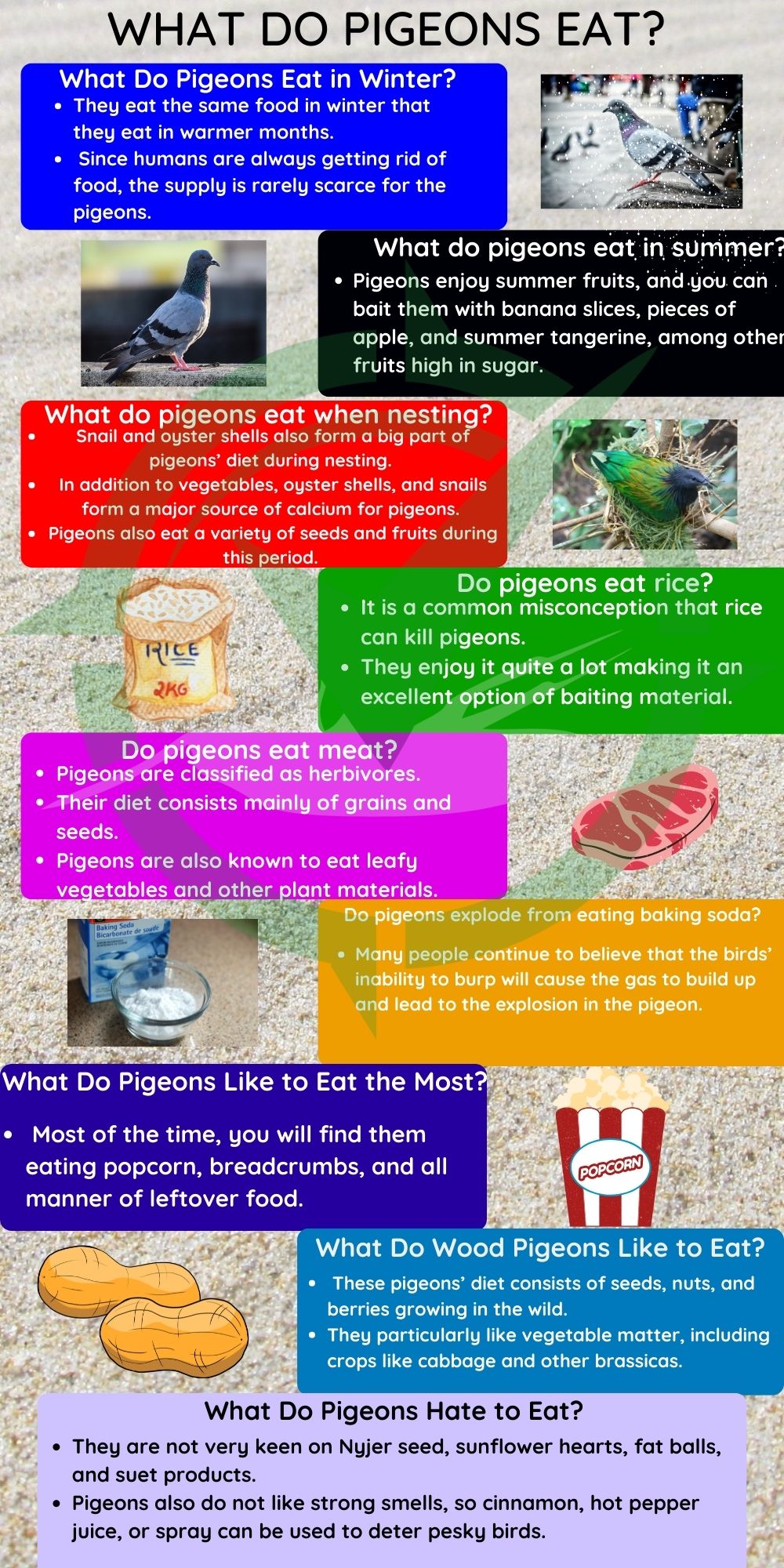
What Do Pigeons Eat on the Lawn?
Your garden probably has a lot to do with attracting pigeons. If there are seed-bearing flowers in your garden, that is bound to draw the pigeons. If you are a bird lover, you are probably putting out bird feed, which effectively attracts pigeons as other birds.
Providing clean water for the pigeons will also attract them. It might be possible that the pigeons are attracted to your house. They usually make their nests under the eaves of houses or some other spot in the building. Pigeons are particularly fond of older properties where they find shelter and security.
Pigeons usually eat almost anything, and this includes grubs and insects. This might be the reason the pigeons are attracted to your lawn.
If you are looking to supplement their meals, you can consider providing them with mealworms and waxworms, which will boost their protein content and prevent them from going hungry.
Pigeons are pretty lazy; hence they grow fat relatively fast. While fat is excellent for the winter, protein is the better option for summer.
It is important to note that the diet of wood pigeons differs from that of city pigeons. Pigeons in the city mostly eat throw-away food, while wood pigeons depend more on Mother Nature.
For wood pigeons, their diet mainly consists of seeds, grains, fruits, and insects. Pigeons living in the wild have more access to abundant grass seeds and wildflower seeds. The grains they eat mainly come from millet, barley, or corn growing in farmland or the wild.
What Do Pigeons Eat in Winter?
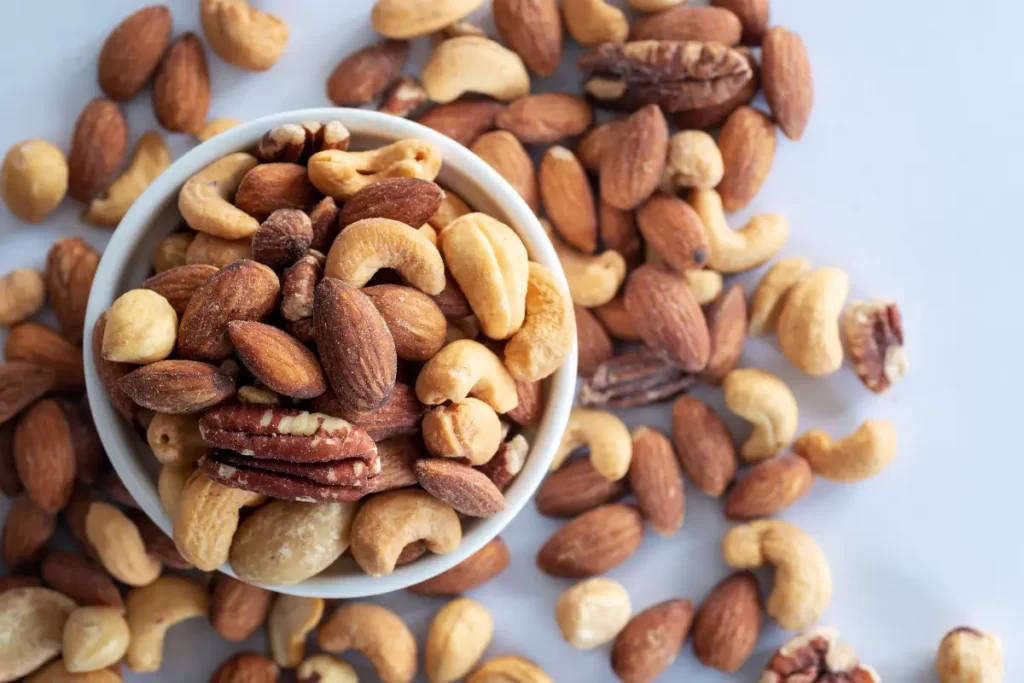
For pigeons living in the city, their diet pretty much stays the same. They eat the same food in winter that they eat in warmer months. Since humans are always getting rid of food, the supply is rarely scarce for the pigeons.
For pigeons in rural areas, things are not as easy. Winter is generally harsh for all members of the animal kingdom due to food scarcity. Since pigeons do not migrate, they feel the severe effects of winter even more. Since the food sources are fewer, the pigeon’s diet has to adapt accordingly.
Pigeons survive the winter by feeding on seeds, nuts, and insects. These might be a bit hard to find during winter, and if there isn’t enough, the pigeons will move to places with more food.
If you want to feed pigeons but do not know what they eat, you can start by providing regular bird feed because they will eat pretty much anything.
In the cooler months, they will benefit more from fat-rich food, so you should consider providing them with some fat suet balls. To survive the cold nights, they will need to top up their fat reserves.
It would be best if you also tried to establish a feeding routine so that the pigeons in your garden will know their feeding time. The best time to feed the pigeons is around early morning and dusk.
What Do Pigeons Eat in Summer?
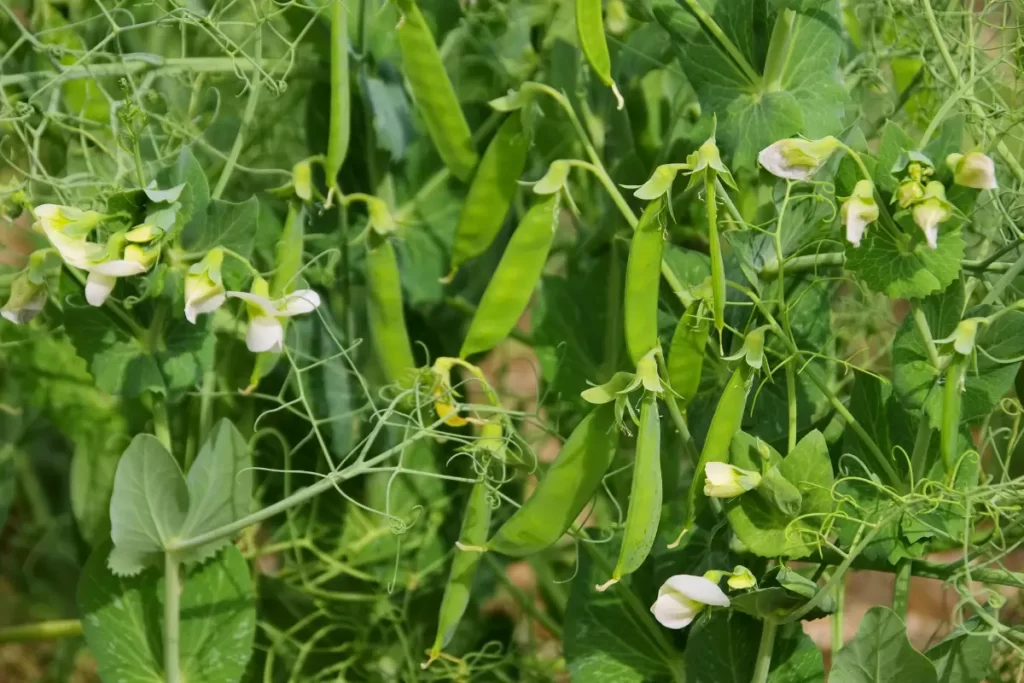
Pigeons are known to change their diet during different seasons, especially in summer. Pigeons continue to lead an active life during summer, which requires lots of energy. This provides you with a variety of baiting materials to choose from.
Summer is quite hot, but it brings with it a buffet of different summer fruits and vegetables that pigeons love. They feed on a wide range of plants but seem to particularly enjoy brassicas such as cauliflower, lilac, peas, cabbages, broccoli, and many others.
Pigeons will enjoy various fruits that grow in the wild, making them free pigeon bait you can use.
However, they are most attracted to specific types of foods during this season, forming ideal baiting material. Pigeons enjoy summer fruits, and you can bait them with banana slices, pieces of apple, and summer tangerine, among other fruits high in sugar.
Seeds have been used as pigeon bait for many years. Any cereals will do, but preferably smaller-grained seeds because they are more enticing as pigeon bait. Seeds that are white like corn are commonly used to trap pigeons around the world.
You can use rice and leftover popcorn as effective bait on your pigeon traps. Peanuts are rich in oil and proteins that are rare, especially for pigeons in urban areas. Leafy greens can also be used as bait during summer.
Juicy vegetables and fruits tend to attract thirsty pigeons. This makes them the perfect bait to use on a hot and dry day. Oranges and grapes are just some of the baiting materials that would be effective in attracting pigeons in the summer.
All these foods form the source of nutrition for most pigeons during the summer months. Try them out and know what is effective for the pigeons you want to trap.
What Do Pigeons Eat when Nesting?
Nesting presents a unique period for pigeons to adapt their diet. A lot of calcium is required to manufacture eggshells, which has to come from their diet.
An interesting fact that you should learn is that pigeons are known to eat snails when mating or nesting. This provides them with lots and lots of protein, minerals, and vitamins.
Snail and oyster shells also form a big part of pigeons’ diet during nesting. In addition to vegetables, oyster shells, and snails form a major source of calcium for pigeons. Pigeons also eat a variety of seeds and fruits during this period.
Nesting is followed by the intense job of feeding the nestlings, which requires energy. Sunflower seeds and other oily seeds avail of fats and proteins that supply energy for flight and muscle maintenance.
Grains like wheat and sorghum also form part of pigeons’ diet when nesting. All these form excellent baiting materials you can use to trap more pigeons nesting in your farm or home. Even though rare, pigeons have been known to eat eggs or eggshells when nesting.
Many other bird species share this behavior. Pigeons may do this if one or two of the eggs fail to hatch. There is no point in letting all that calcium and egg protein go to waste; use it in your pigeon trap to attract nesting pigeons.
What Do Pigeons Eat In The City?
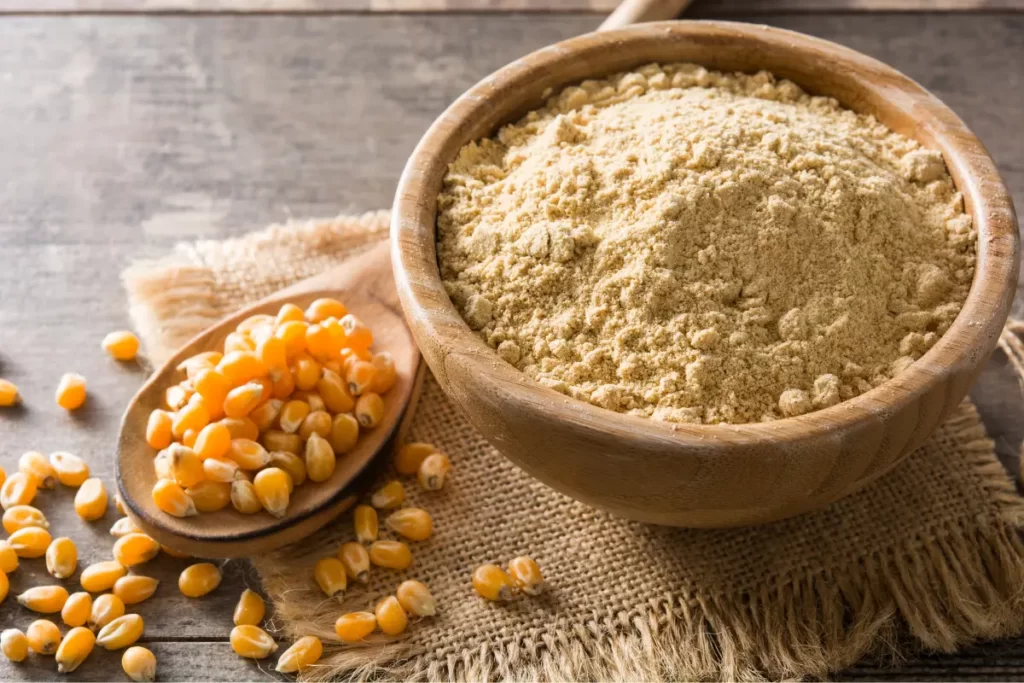
Pigeons have lived alongside human civilizations for millennia. It is no surprise that this changed their eating habits. After all, humans and pigeons share many delicacies.
The other reason that city pigeons eat differently from rural ones is bird feeding. Pigeons in the city can expect to be fed on a variety of allowed foods.
City pigeons eat rice, peas, corn, and bread crumbs, among other things, which can all be used as bait. These pigeons will also go through your trash and eat whatever is edible.
Any human food made with cereals like wheat for human consumption will be perfect as a baiting material. However, the pigeons will supplement this with typical pigeon food like nuts and greens. It is advisable to use a mixture of these to attract as many pigeons as possible.
These may include oats, linseed, peas, and uncooked rice. It is worth noting that not all human food is as effective as pigeon bait. The final city pigeon bait that you may want to try is our pieces of French fries.
Pigeons in the city are baited optimally with a mixture of many different seeds together with alternative baiting materials discussed here.
Do Pigeons Eat Rice?
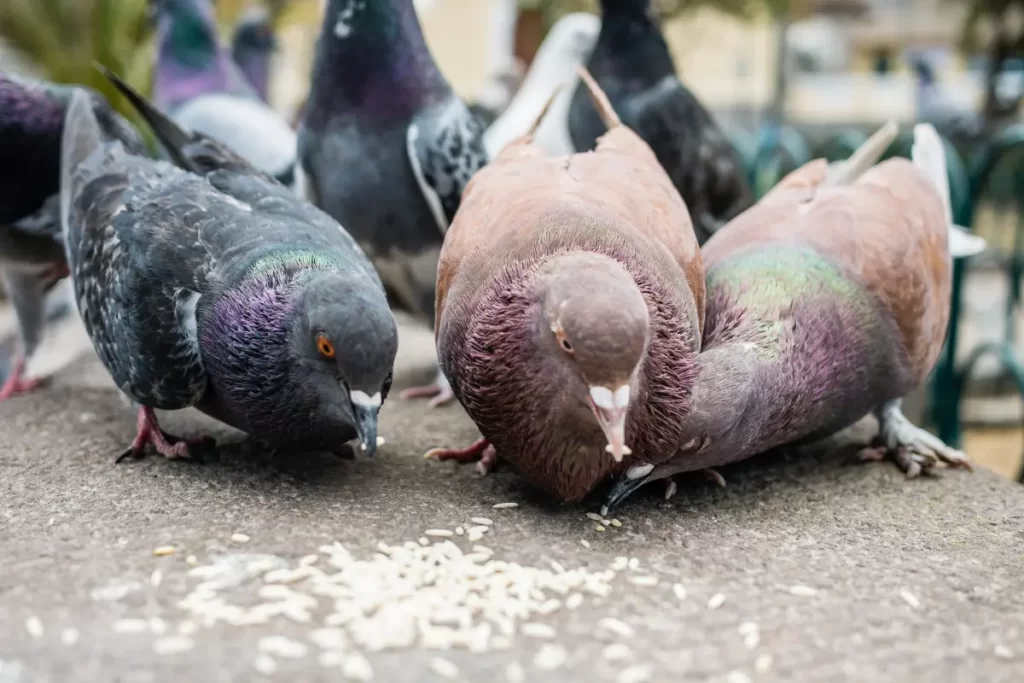
Even though it is a common misconception that rice can kill pigeons, they enjoy it quite a lot making it an excellent option for baiting material. Rice is not fatal to pigeons, and you should not expect to watch pigeons explode as they eat it.
However, it is one of the most common pigeon baits used all over the world. Rice is also affordable in many parts of the world.
Pigeons evolved alongside other birds, and their ancestors must have been rice feeders for a very long time. This myth may have originated from a misunderstanding of the expansion process of rice as it absorbs water.
It is worth mentioning that this only happens when the rice is cooked at high temperatures, which would be hard to achieve in the gizzard of a pigeon. Even though it will not cause the pigeons to explode, rice is among the most effective pigeon baits you can use.
Pigeons swallow rice grains whole, and the food is then directed to a specialized pouch for further digestion. Like many other birds, the stomachs of pigeons require grit to digest food adequately.
You can sprinkle baiting rice on the dirt without worrying that it will mix with the sand. The white color of rice improves its visibility. This improves its effectiveness in attracting pigeons that fly above your trap. You can therefore use rice as an effective and safe bait to trap pigeons.
Do Pigeons Eat Meat?
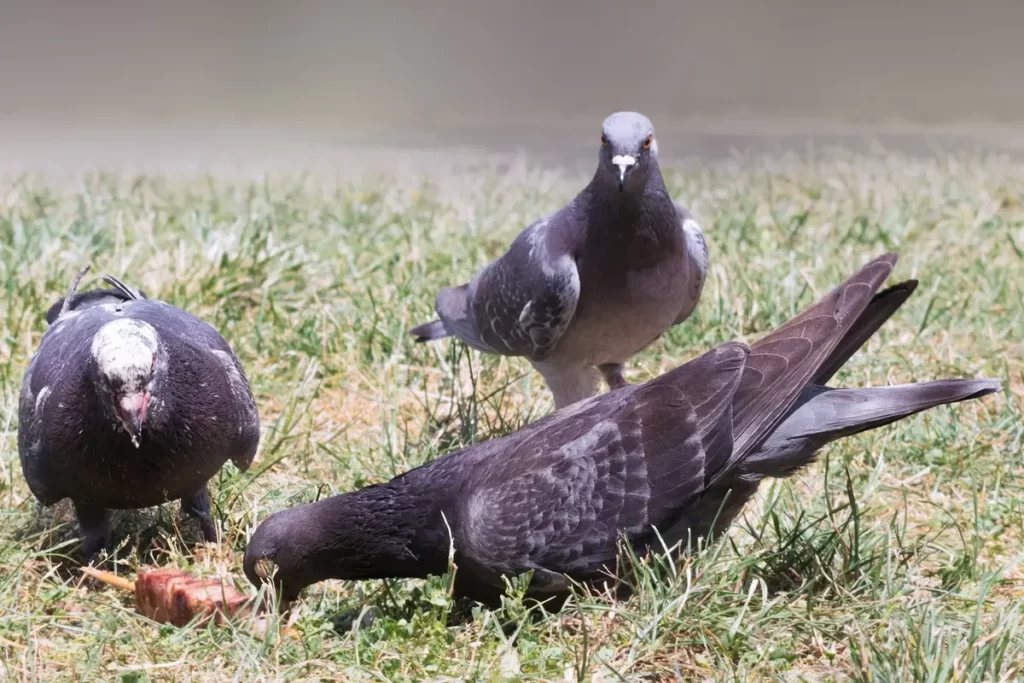
Pigeons are classified as herbivores, and their diet consists mainly of grains and seeds. Pigeons are also known to eat leafy vegetables and other plant materials. Even though meat does not form part of the natural diet, pigeons occasionally try meat.
Pigeons are scavenging birds, and they will try almost anything they think is edible. Living alongside humans, pigeons must have encountered meat regularly in their environment.
Pigeons have specialized stomachs called gizzards with a rudimentary digestive system. This means that meat will be improperly digested, unlike other pigeon diet components like grains and seeds.
This happens even when the meat is cooked as pigeons are not adapted to absorbing nutrients from meat. This reason makes meat unsuitable for use as pigeon bait. Pigeons swallow their food whole and cannot be relied upon to grind down the meat properly, and grinding it may improve its effectiveness as bait.
Pigeons have a high metabolic rate which means they are constantly eating. This improves the likelihood that meat may also be used as pigeon bait.
Meat-eating behavior in pigeons is attributed chiefly to pigeons in cities where human food is abundant, and it may not be practical to use it as pigeon bait in rural areas.
Pigeons get into contact with different types of meat daily, and there are obvious preferences. This can be anything from fried chicken to pieces of burgers and other meat-containing processed foods.
Ground and cooked meat may be the best kind of meat to use if you want to trap pigeons in this way. Experts may recommend using meat with another type of bait that is in the natural diet of pigeons.
Do Pigeons Eat Bread?
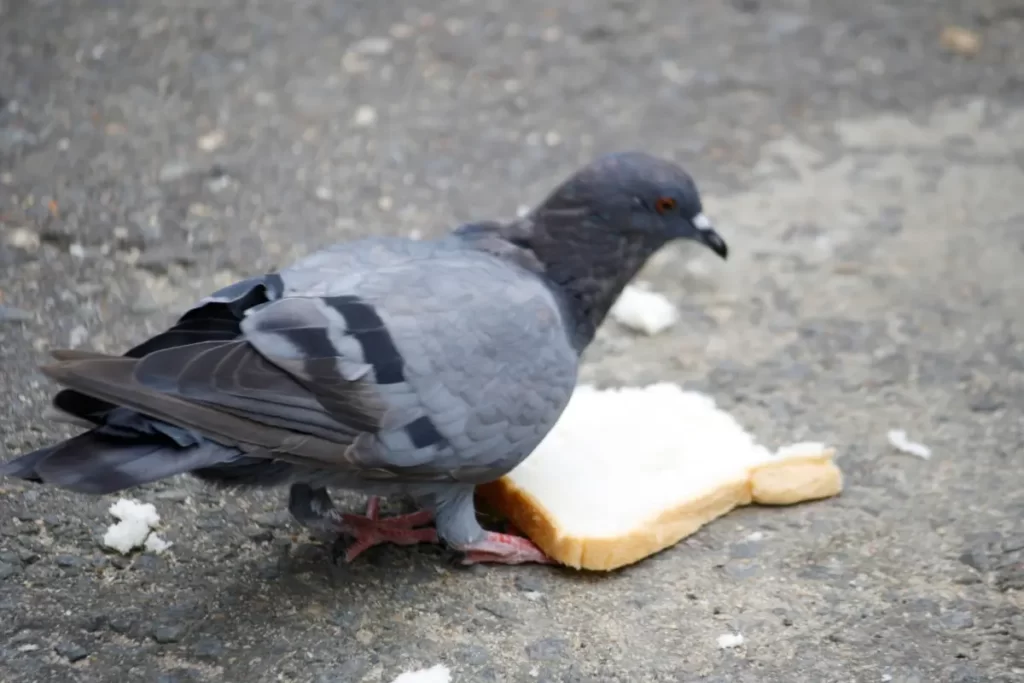
Pigeons come into contact with a lot of bread, especially when they live in cities. It is worth noting that bread is not a good diet for pigeons because of its low nutritional content.
However, pigeons cannot get enough of it. Pigeons are very active birds, and they require a variety of nutrients to help maintain their high rate of metabolism.
Bread provides a quick and short-lasting boost of energy that will have pigeons craving for more. This makes bread and breadcrumbs one of the favorite pigeon bait, especially in cities.
When other food sources dry out, pigeons can be seen scavenging for bread in dumpsters. When other options for pigeon bait to use are missing, bread may be the way to go.
Many households buy bread on a daily basis, and some of it may end up in the trash. You can cut the bread into smaller pieces that are easier to eat for pigeons. The white or brown color of the bread makes this bait visible to pigeons from afar.
If you do not wish to spend a lot of time or money buying expensive pigeon bait options, you can always rely on a slice of bread to do the trick.
Do Pigeons Eat Worms?
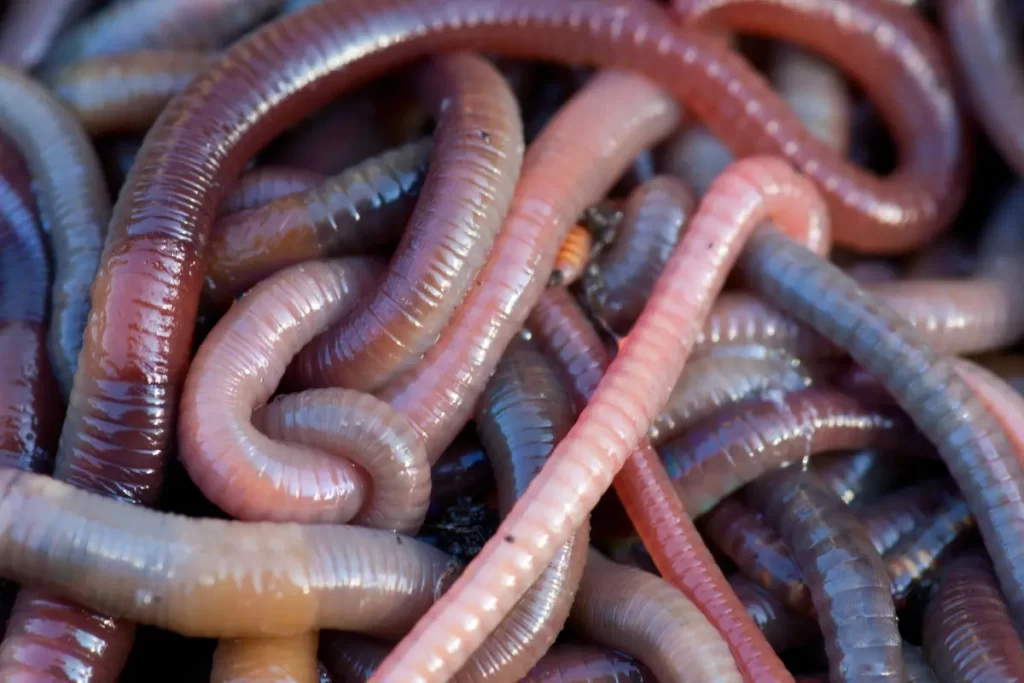
Just like many other species of birds, pigeons love eating worms. Worms have formed the diet of pigeons for millions of years, and this is not going to change anytime soon.
Even though pigeons are mainly herbivorous, eating only nuts and grains, they are also known to eat worms, fruits, and leafy vegetables.
Worms provide a rich source of protein and other nutrients essential in maintaining the high rate of metabolism in pigeons, making them irresistible as bait. Worms form a particularly efficient baiting material for pigeons living in rural areas.
When farmers are tilling their farms, they unearth worms that you can pick up and use as bait. Finding an adequate supply of worms in urban areas is not hard.
Sources of worms for many pigeons include open fields and gardens. Because of plenty of food, especially for pigeons living in cities, it may not be practical for pigeons to hunt for worms.
Pigeons only dine on worms if availed of the opportunity. Worms form moving targets which entice more pigeons to enter the trap. Pigeons eat a variety of worm species, among other ground-dwelling insects.
You should try using worms as baiting material and see how the pigeons respond. Dig anywhere the soil is moist and gets enough baiting worms for your pigeon trap.
Do Pigeons Eat Sunflower Seeds?
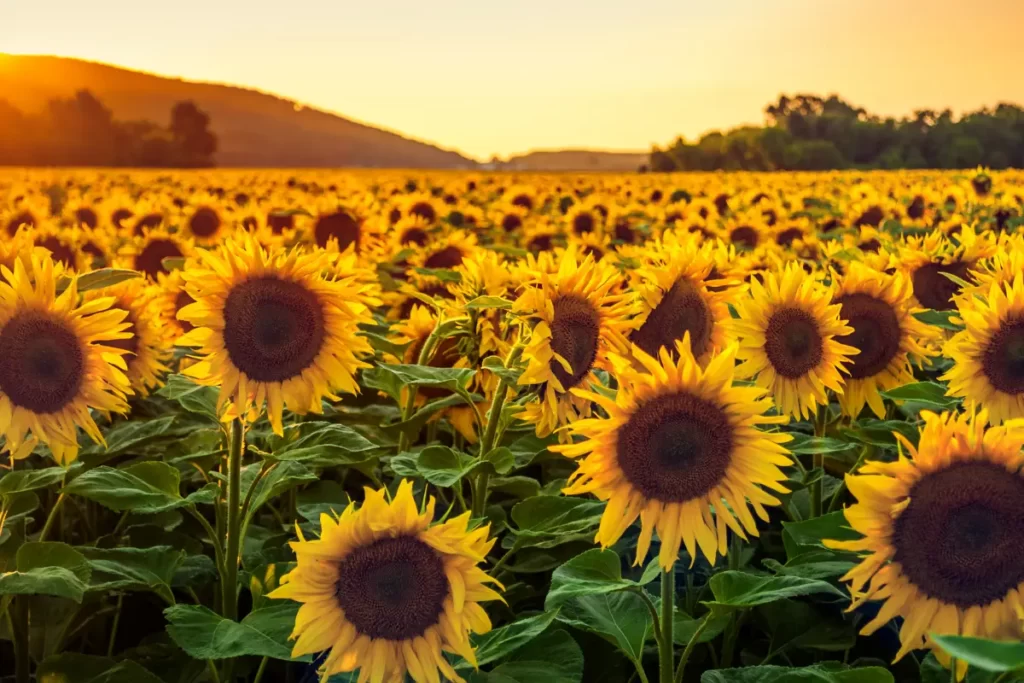
Most pigeon experts will conclude that sunflower seeds are among the best things that pigeons can eat. On top of the amazing taste that sunflower seeds have, pigeons love them for their higher nutritional value, making them excellent bait. Many professional pigeon trappers will recommend using sunflower seeds as bait.
Pigeons particularly enjoy striped sunflower seeds and black oil sunflower seeds. Sunflower hearts are an even better baiting material. Pigeons love sunflower hearts because it is easier for them to digest them.
There are few baiting materials that are as enticing to pigeons as sunflower hearts. However, pigeons are also known to eat the entire sunflower seed. This means that they may be just as effective.
To make things easier, pigeon bait sellers can offer you sunflower seeds with the shells already removed. Sunflower seeds are particularly recommended as bait for pigeons during winter.
This is because the fatty nature of sunflower seeds makes them an ideal source of fat for pigeons. Some of this fat may be converted into energy as body warmth, while the rest provides heat-insulating properties.
Fatty seeds like sunflower seeds will help you trap more pigeons when it is cold. This is recommended for those who want to control the pigeon population on their farm or neighborhood throughout the year.
Go to your farmers market and get some sunflower seeds to try out as bait for your pigeon traps and discover their effectiveness.
Do Pigeons Eat Mealworms?
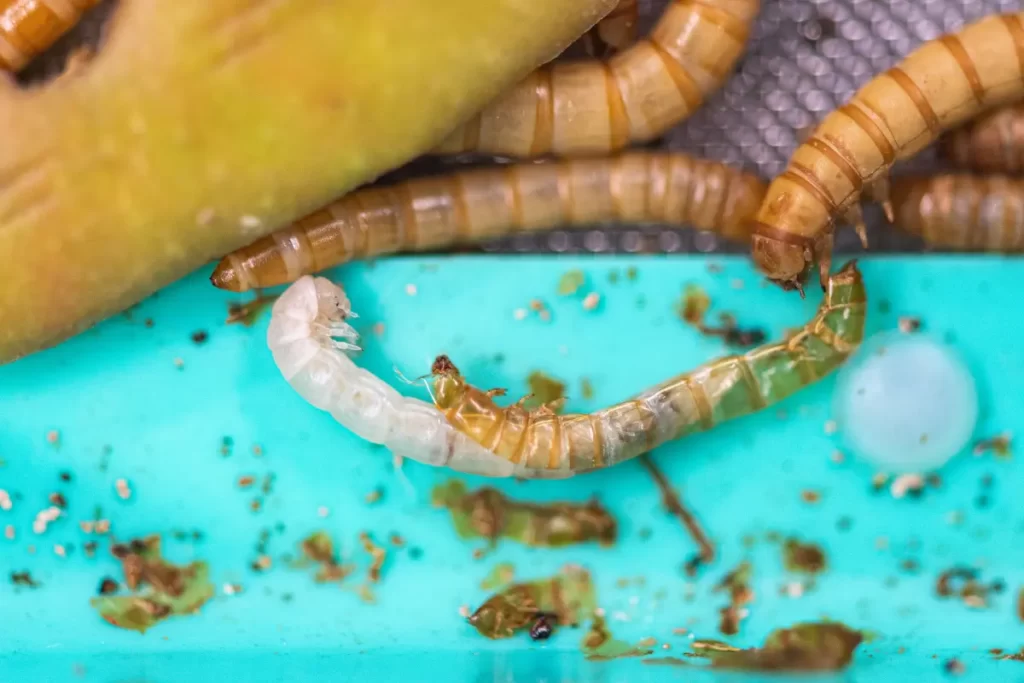
Mealworms are another favorite diet for many pigeons. Mealworms are particularly preferred by pigeons that have grown accustomed to their addictive taste. You should, therefore, not be surprised if some pigeons will not be able to resist mealworms when you use them as bait.
Because of the elusive nature of mealworm beetles and their larvae, it will be difficult for a pigeon to find many of them in the wild.
When they see someone in your trap, they will make a dash for it. The commercial breeding and selling of mealworms as pigeon bait make this an affordable and effective pigeon bait for many people.
The commercially bred mealworms are given hormones to help maintain their larval form—most mealworms attend a length of about 2 cm. Mealworms continue to form a nutritious diet for humans, animals, and birds alike.
Mealworms may attract other animals or birds to your trap which is a downside of this pigeon bait option. Most wild pigeons will readily eat any mealworms they find because food sources may be limited for them.
However, some city pigeons may not respond as quickly to this type of bait because of the abundance of alternative food sources.
The mealworms are dried to enable effortless storage. It would be best if you only used a handful of mealworms at a time so that you do not overfeed them. If you want to capture many pigeons at once, mealworms provide an easier way to achieve this.
Do Pigeons Eat Ants?
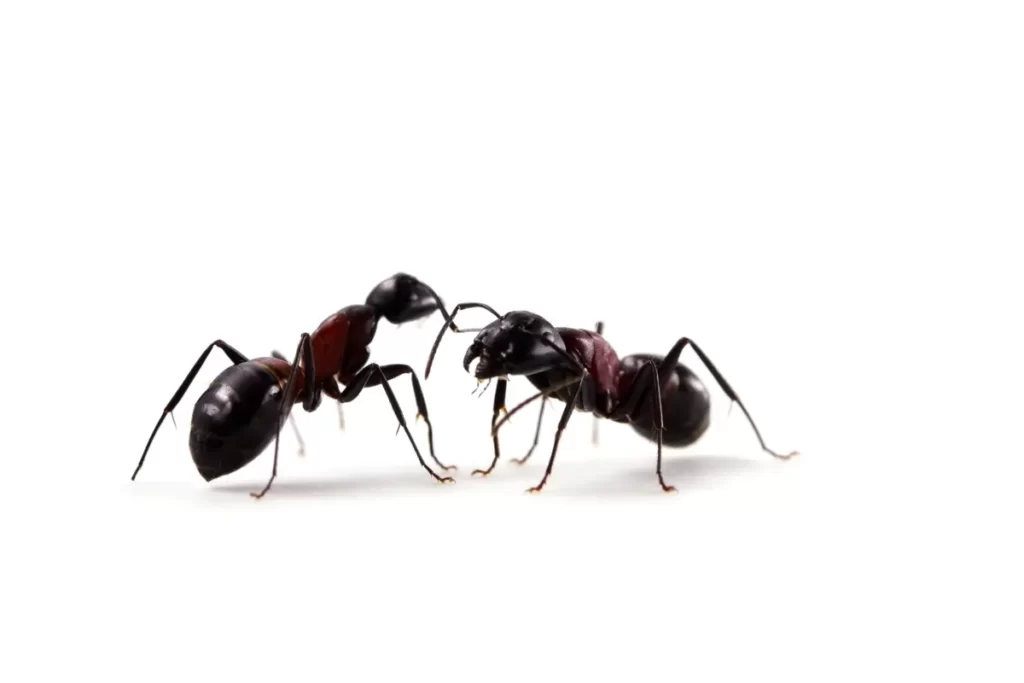
Pigeons are generally herbivorous birds, but they do occasionally eat grubs and larvae. However, pigeons are not known to eat ants on a consistent basis. This means that ants are not reliable bait to use in trapping pigeons.
This may come as a surprise to many people. Most people may relate the packing behavior of pigeons to mean that they are eating ants.
If you see a pigeon pecking on your lawn, they are not necessarily eating ants. In most cases, they will be consuming pieces of grit that are necessary for their digestive tracts to function, or they’re looking for nest-building materials.
Ants are quite aggressive creatures, and a pigeon may not want to come close to them. You might be wondering whether dead ants can be used as bait in trapping pigeons.
There is no reliable evidence that points to the successful use of ants in baiting pigeons. If you want to succeed in beating pigeons, there are a variety of other insect larvae that wild pigeons love.
However, pigeons living in rural areas are more prone to shift from their exclusive herbivorous nature than pigeons in towns. Pigeon trapping experts recommend that you utilize other bait options that pigeons naturally feed on before deciding to use ants.
Do Pigeons Eat Other Birds?
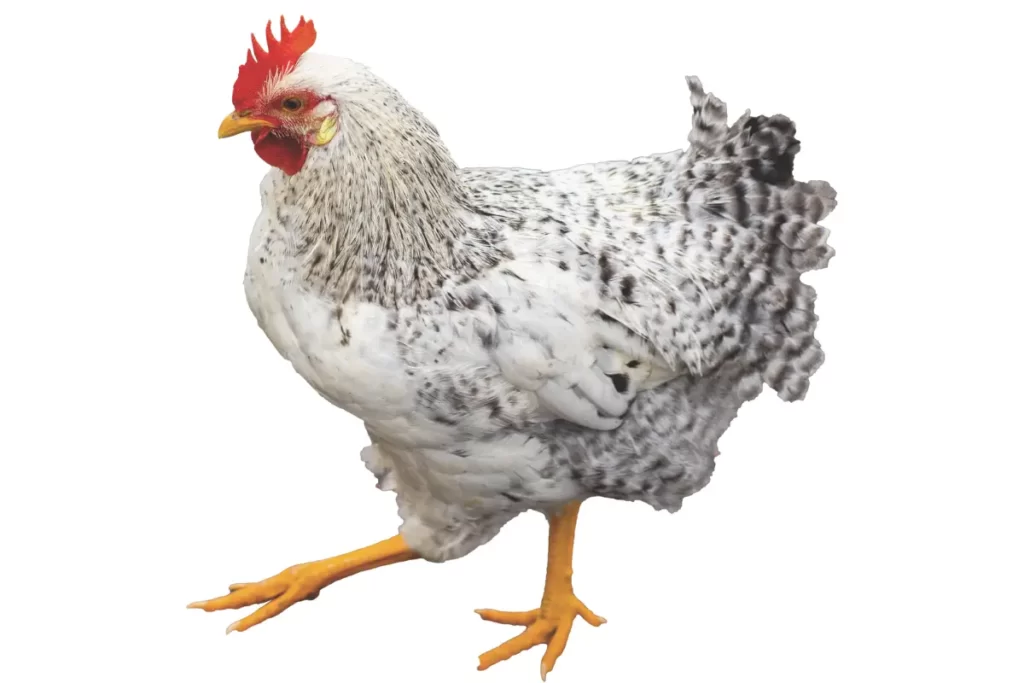
Even though many birds kill and eat other birds, pigeons do not fall into this category. However, pigeons in towns are known to eat meat from other birds like chickens.
It is arguable that some pigeons may be driven to eat cooked chicken if it is coated with breadcrumbs. There are fewer scenarios where pigeons are observed eating other birds or any animal flesh.
This rules out the use of dead birds as pigeon-baiting material. The reason why pigeons can’t eat other birds is quite simple.
With a digestive tract that was only meant to handle grains and vegetables, it is largely inadequate in digesting the meat of other birds. Pigeons also lack sharp claws and beaks that will be needed to tear the flesh of birds.
These and other features prevent pigeons from hunting down or eating dead birds. If you wish to trap pigeons efficiently, the best bait you should use should be from the herbivorous category. Deviating from this category will only mean less effectiveness in attracting and trapping pigeons.
If you are to use the meat of other birds to lure pigeons to your trap, it may be more efficient for city-dwelling pigeons than rural pigeons. One reason that may be attributed to some instances of pigeons eating other birds is when other food materials are scarce.
Pigeons are scavenging birds, and they will generally eat anything they can predict is edible.
Do Pigeons Feed On Grass?
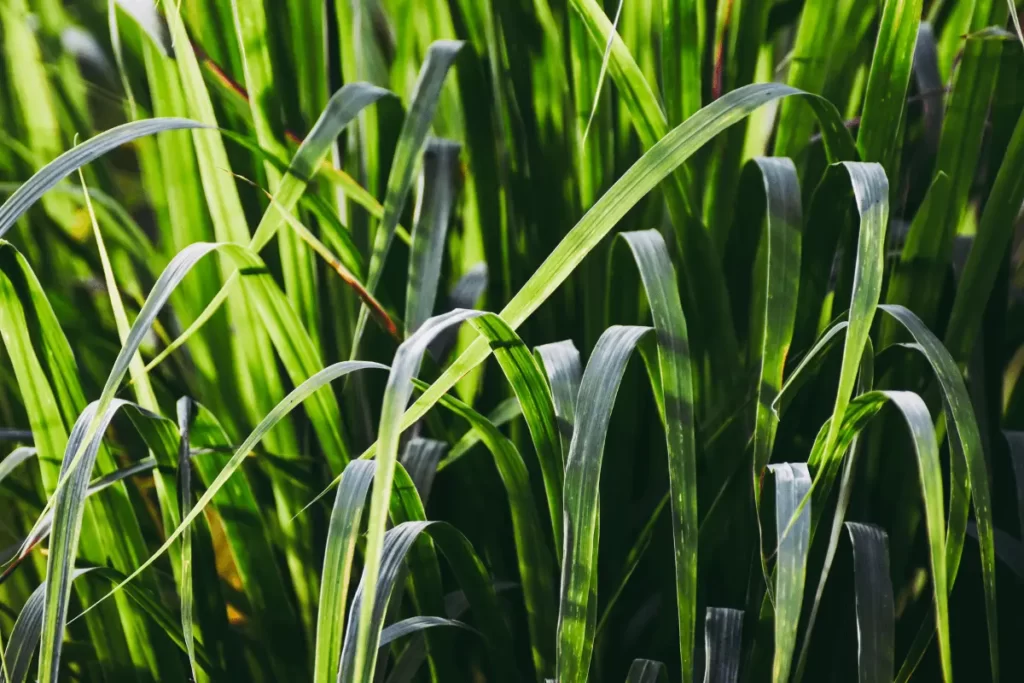
Pigeons have gotten a reputation for eating almost anything. However, pigeons are not known to eat grass. It is important to note that pigeons also eat leafy vegetables, which are soft and succulent.
The grass may prove to be a challenging diet for pigeons because it is tough and fibrous. The design of a pigeon’s beak makes it useless against eating grass.
It would be best to always consider these things when selecting appropriate bait to use for your pigeon trap. You should not lie in wait and expect that grass will attract pigeons to your trap.
Another credible reason that may be given to explain why pigeons don’t eat grass is its low nutritional value. The one thing that you should notice about herbivorous animals is that they are always eating.
The grass is low in many essential nutrients, making it unsuitable for regulating the high metabolic rate of pigeons.
If you see a pigeon taking on your lawn, the probability is high that they’re looking for worms or grit. Some grass species also produce seeds that are small and of a high nutritional value compared to the leaves. Most birds, including pigeons, will be able to eat grass seeds that are small and digestible.
The other reason you may see pigeons with grass on their beaks is that it intends to build a nest. When the breeding and nesting season comes for pigeons, you will start seeing pigeon nests appearing everywhere and the most common building materials are small twigs and grass stalks.
Do Pigeons Eat Other Birds’ Eggs?
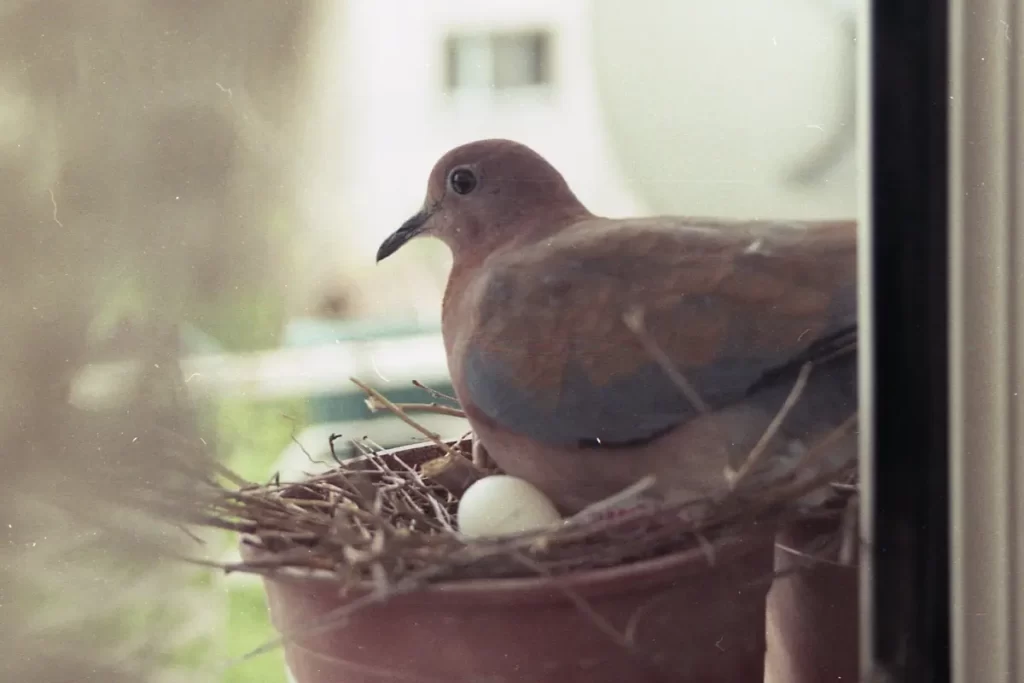
Eggs are among the richest sources of proteins and other nutrients that any animal can have. A variety of different birds have been known to dine on the eggs of other birds. You may be wondering why pigeons also eat the eggs of other birds.
Even though the main diet of pigeons is exclusive to grains and vegetables, there are occasions when pigeons eat the eggs of other birds. However, such situations can only be brought about by the scarcity of alternative sources of nutrition.
Pigeons are very docile birds, and you will not expect them to aggressively attack the nest of another bird in search of eggs.
Eggs are a rich source of nutrients for many animals, and pigeons are not an exception. Pigeons may be drawn to eating eggs because of their rich source of proteins coupled with minimal sugar.
The fat content of eggs like chicken eggs is also essential in maintaining the body heat of pigeons. It is more likely that a pigeon will break and eat one or more of its eggs other than invade another bird’s nest.
The eggshells are a high source of calcium that pigeons may take even from their own hatched eggs to help boost the levels of the mineral in the body. Calcium is also essential for good bone health in pigeons.
Do Pigeons Explode From Eating Baking Soda?
A popular myth that you may have heard of is that pigeons explode after taking baking soda. The myth works on the assumption that baking soda will react with the acidic juices in the pigeon’s gizzard.
This reaction would then release a lot of gas that would be responsible for the explosion of the pigeon.
There has been no substantial proof for this. However, a variety of other chemicals may have the potential to achieve this result in pigeons.
This may include magnesium silicide and calcium carbide, which are quite rare to find naturally and therefore do not pose any immediate danger to pigeons.
Many people continue to believe that the bird’s inability to burp will cause the gas to build up and lead to an explosion in the pigeon.
Baking soda is not sufficient to produce this kind of effect. While baking soda will not cause pigeons to explode, the substance is dangerous to pigeons in other ways.
Pigeons that have been given baking soda tend to have diarrhea and may become bloated in some instances.
Baking soda does not offer any additional value to pigeons, and they will not naturally seek it. The only conceivable way that pigeons can ingest baking soda is when mixed in their food or when forced to consume it.
Do Pigeons Eat Tomatoes?
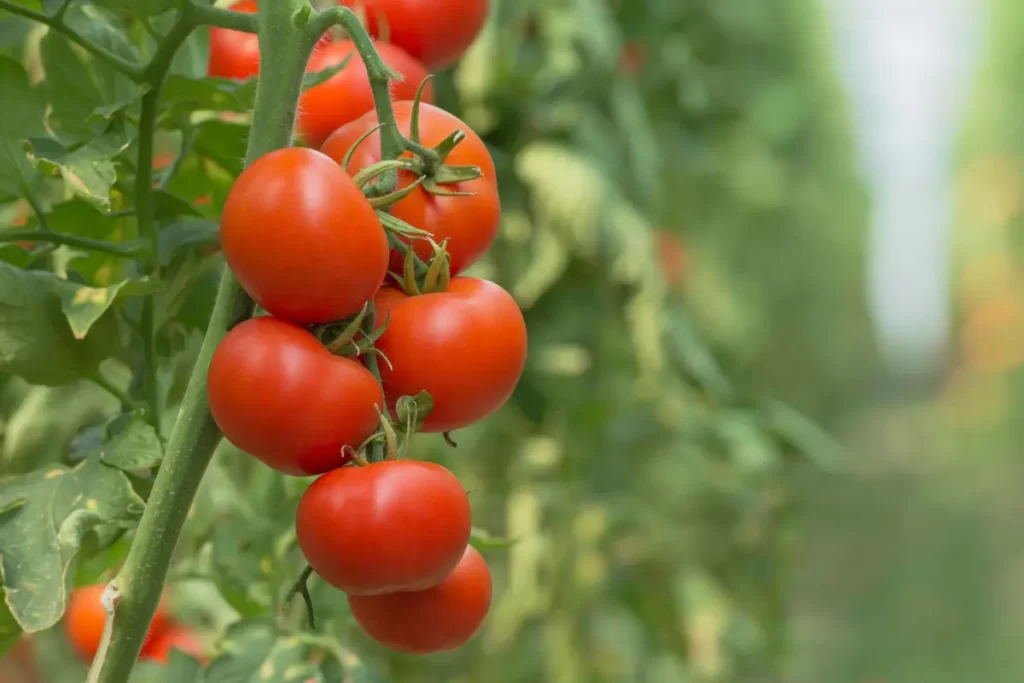
Tomatoes have always provided a rich source of vitamins and water to pigeons. The acidic fruit is bright red when ripe, which attracts pigeons from afar. This will not be a cause for worry because there are a variety of different methods you can use to keep pigeons from tomato plants.
However, if a group of pigeons makes its way into a tomato farm, you are sure that they will damage the crop.
Tomatoes are soft and succulent, which gives pigeons an easy time when eating them. Pigeons are grain eaters, and they do not have strong or sharp beaks.
Tomatoes are quite nutritious fruits, and they provide a lot of proteins, carbohydrates, and fiber content when eaten by any animal. Pigeons require these nutrients more because of their high metabolic rate making tomatoes a favorite for them.
Tomatoes are an excellent source of vitamins like ascorbic acid, vitamin E, and retinol. Tomatoes also contain minerals like magnesium and potassium necessary for a healthy pigeon.
The powerful antioxidant properties of tomatoes also assist in mitigating the effects of environmental stress on pigeons.
This is especially the case for pigeons living in the city, where they get into contact with a lot of processed products that do not form part of the natural diet.
The acidic nature of tomatoes may discourage the birds from excessive consumption. Tomatoes are big fruits compared to the size of the pigeon, and more destruction than conception is to be expected.
Wild pigeons are particularly known for eating tomatoes, making it necessary for farmers in rural areas to find ways of protecting their crops.
What Do Pigeons Like to Eat the Most?
Pigeons are always on the lookout for food, shelter, or a mate. For both domestic and feral pigeons, their diet primarily consists of grains and seeds.
So if you are experiencing challenges with getting rid of the pigeons, the reason might be because there are grain and seeds in your garden that attracts the birds.
Additionally, feral pigeons eat whatever is thrown away by people. Most of the time, you will find them eating popcorn, breadcrumbs, and all manner of leftover food.
Domestic pigeons are luckier in their diet because they are fed their favorite food, mainly grains of peas, corn, wheat, and sorghum. These grains are usually fed to the pigeons raw. The eating habits of pigeons differ quite a bit from other birds.
Pigeons will swallow the food whole and then store it at the base of their throat before passing it into the digestive system. Pigeons need to consume grit alongside their food.
This can be anything from small pebbles to rocks. This is important in processing the food so that it can be easily broken down into nutrients.
What Do Wood Pigeons Like to Eat?
Wood pigeons are also quite a common sight in most gardens. They are typically larger than the other pigeons and other birds as well. They mainly move in flocks of hundreds of birds and can be identified by the white patches on their necks.
Unlike feral pigeons, which eat pretty much anything they find, wood pigeons are vegetarian in nature. These pigeons’ diet consists of seeds, nuts, and berries growing in the wild. They particularly like vegetable matter, including crops like cabbage and other brassicas.
Wood pigeons also love eating grains and shoots, and this is why they are considered pests. During the autumn months, their diet is mainly made up of ivy berries.
They are known to cause tremendous damage to farmers’ fields when they descend into a huge feeding flock and feed on the plants.
While the other birds tend to flutter around the garden and peck at the food, wood pigeons usually settle in and eat their fill.
These birds peck at the leaves of the plants and tear them off, usually leaving behind the stalks. They are one of the bird species that have a crop. This is a pouch in the throat that is used to store food.
When the pigeon’s stomach is full, it does not have to stop eating. Instead, it diverts the food to its crop, where it is stored until the stomach is empty and digestion can begin. Wood pigeons generally fill their crops several times a day, resting between meals for digestion.
What Do Pigeons Hate to Eat?
As already seen, pigeons will eat almost anything. However, they are not very keen on Nyjer seed, sunflower hearts, fat balls, and suet products. Pigeons also do not like strong smells, so cinnamon, hot pepper juice, or spray can be used to deter pesky birds.
There are also common foods that are toxic to pigeons. A good example is an avocado. The leaves of the avocado plant contain a fatty acid-like substance known as persin that kills fungus in the plant.
Ingesting avocado is therefore hazardous to pigeons. Other common foods that are poisonous to pigeons include onions and garlic, xylitol, salt, fat, fruit pies, apple seeds, caffeine, and chocolate. In fact, chocolate is among the most dangerous substances for a pigeon to ingest.
If pigeons eat chocolate cake with artificial chocolate flavor, this might not be too dangerous. However, if there are real pieces of chocolate, this could kill them.
Chocolate is a pretty toxic substance, but the amounts we consume are not enough to cause us any harm. For a small bird, however, small amounts of chocolate are enough to kill them.
Although the birds seem to enjoy eating bread, it is not a healthy source of nutrition for them. Pigeons need fats and proteins to sustain their health and give them energy. These nutrients are not found in white bread.
Additionally, pieces of bread that are too large for the bird to swallow can cause digestive blockage. Also, when bread is left outside, it develops mold in no time, and eating this bread can cause the pigeons to be ill.
How Do I Stop Pigeons from Eating My Cabbages?
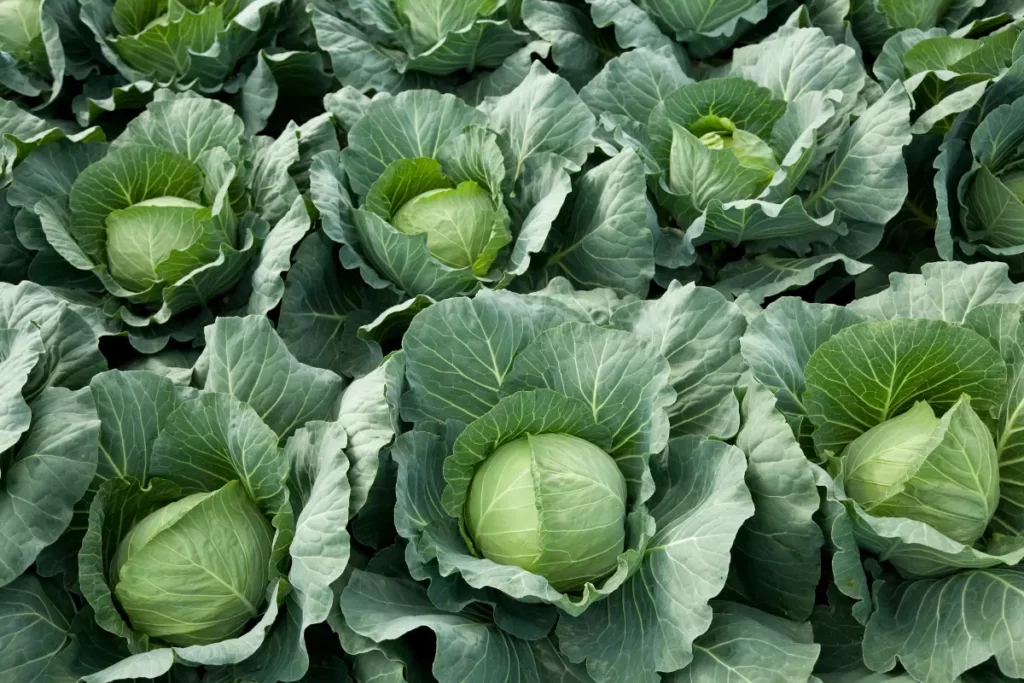
Pigeons, both wood pigeons and rock doves, are pretty fond of cabbages and other members of the brassica family. Wood pigeons are particularly ferocious when it comes to devouring cabbages.
In most cases, they descend in flocks and eat their fill. There are several different ways to prevent this from happening to your beloved cabbage patch.
- One of the most common methods of protecting your cabbages is through netting the crop. There are several inexpensive nets available to help keep your plants safe.
- These nets are finely woven to keep away both white cabbage butterflies and pesky pigeons. The netting can be draped over sticks and tramped down with stones or bricks.
- They are also pretty easy to remove whenever you need to weed or harvest. Green netting is another option that is also quite affordable. This will require a cage of sturdier construction.
- The cage should not have a landing post because the pigeons will sit on it and peck through the netting. The cage must sit high above the cabbages.
- You should ensure you close all the gaps so that smaller birds do not make their way into the cage and get stuck.
- You can do this by planting a dense cover of wildflowers around your cabbages. Most likely, the pigeons will not wade through the flowers to get to the cabbages because they do not know what may be lurking beneath.
What Do Baby Pigeons Eat?
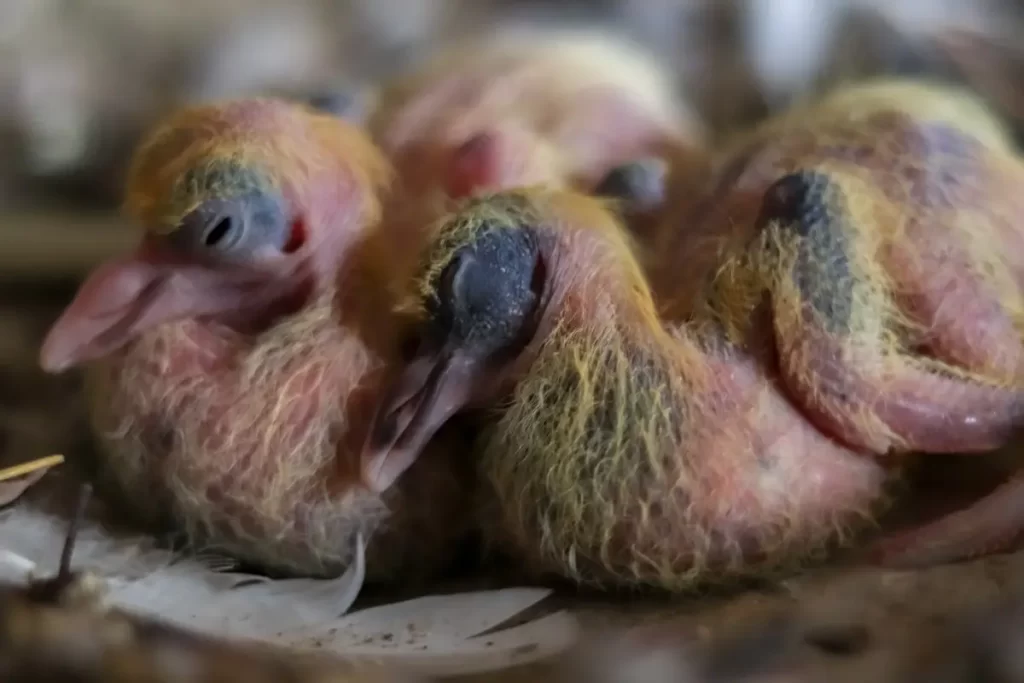
Pigeons are wild birds that eat a variety of things to live. Whether wild or domesticated, Pigeons eat seeds, tiny insects, and even small lizards in about the exact quantities. It’s critical for infant and newborn pigeons to have a high-protein diet to aid their early growth.
Adult pigeons do not need such large quantities of protein, but for the newborn pigeons’ muscular development, muscle and tissue, macronutrients are critical.
A protein deficiency can occur if baby pigeons do not obtain certain minerals and proteins.
From this age forward, their nutrition consists exclusively of milk provided by their mothers. We’ll look at some of their most common dietary foods and behaviors, as well as what baby pigeons consume and shouldn’t be fed, in the sections below.
What Is The Baby Pigeon Diet- After One Week
Baby pigeons will eat various foods with their primary crop milk after one week or less. Young pigeons will no longer need crop milk during the first three weeks since their digestive systems are capable of digesting the food that it’s supposed to be for adult pigeons.
Baby pigeons at times will only digest broken meals if their parents give them crop milk (to help boost digestion).
What Is The Baby Pigeon Diet After One Month
Baby pigeons will manage to eat different meals safely only when one month has passed. However, to acquire and ingest food effectively, they ought to first know how to decamp from their nests and also fly securely.
Should I Worry About What My Pigeons Eat?
As the pigeons age, their digestive tracts become more capable of handling most meals. Urban pigeons are more likely to ingest a more extensive range of foods, some of which are hazardous (such as nourishment collected from dumpsters etc.).
As previously said, whether pet or wild, pigeons and doves require a balanced diet of seeds, fruits, nuts, and vegetables to be healthy.
Our Final Thoughts
Pigeons are generally present throughout the year, but they are more likely to visit gardens during early summer when the brassica crops are developing.
During winter, the pigeons travel in flocks of up to 50 birds and land on farmlands to feed. At other times, it is more common to see them in smaller numbers. Their diet must contain protein and fat in order for them to remain healthy and energized.
These nutrients can be obtained from nuts, fruits, and even other animals. As the pigeons get older, their digestive systems are capable of consuming most food without a problem. Urban pigeons are scavengers that eat whatever is available.
Most of the time, some of the food they eat contains contaminants. Years of evolution and adaptation have enabled them to survive such conditions.
It is crucial, however, to note that some food substances such as apple seeds, avocados, and chocolate are hazardous to the health of pigeons; if pigeons consume such food it results in health problems or even sudden death.
